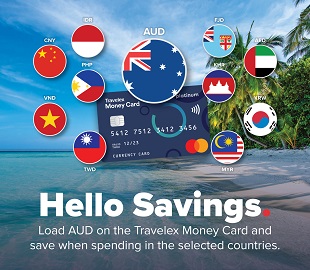Rates FAQ
Why do exchange rates change?
The exchange rates of the world’s currencies constantly move up and down against each other based on supply and demand. The more in demand a currency is, the higher its price will be. Changes in the foreign exchange market can be caused by this supply and demand, as well as by political and economic events.
Does it pay to shop around and compare currency rates?
There are a lot of foreign currency providers in Australia, mainly high-street banks, all offering you a range of products and services. You can spend a lot of time to trying to find the best exchange rate in the market. But there’s usually very little difference between rates offered – sometimes it can be a matter of cents.
Why are tourist money exchange rates not the same as the market spot rate?
The market (or spot) exchange rate is the rate banks exchange currencies at. A lot of extra processes and people go into providing you with currency. The cost of these is reflected in the price of the currency.
At Travelex, we work hard to give you great value for your foreign currency.
We’re constantly striving to do things more efficiently, so that because we want you to get the best possible deal we can offer.
Why do currency exchange rates move?
Currencies constantly move up and down against each other as financial markets change. These movements can be caused by supply and demand, as well as by political and economic events.
How to calculate exchange rates?
Exchange rates are influenced by banks and trading institutions and the volume of currency they are buying and selling at any given time. Currencies are traded (bought and sold) daily around the world.
One currency can be purchased by another currency through banking institutions or on the open market. The volumes of currencies traded are increased and decreased depending on the attractiveness of any particular currency, which depends on a multitude of factors such as political stability, economic strength, government debt and fiscal policy among others.
Government central banks also have the ability to set a currency at a constant price through a method called pegging, which essentially tethers the value of one currency to another. The value (or price) of a currency is determined by its traded volume. If a currency is competitively priced, traders will buy the currency, essentially driving up its value. If a currency is not competitively priced, traders may avoid buying, or even sell it, essentially driving down its value.
If I have a question, who can I speak to?
Rest assured, we're doing everything we can to make this as simple and easy as we can. However, if you have any questions about the upcoming change, we're always here to help.
You can call us 24/7 on 1300 300 524 in Australia.
 USA - USD -
USA - USD -  Europe - EUR -
Europe - EUR -  UK - GBP -
UK - GBP -  Japan - JPY -
Japan - JPY -  Australian - AUD -
Australian - AUD -  Brazil - BRL -
Brazil - BRL -  Brunei - BND -
Brunei - BND -  Cambodia -
Cambodia -  Canada - CAD -
Canada - CAD -  Chile - CLP -
Chile - CLP -  China - CNY -
China - CNY -  Colombia - COP -
Colombia - COP -  Czechia - CZK -
Czechia - CZK -  Denmark - DKK -
Denmark - DKK -  Egypt - EGP -
Egypt - EGP -  Fiji - FJD -
Fiji - FJD -  French Polynesia / New Caledonia - XPF -
French Polynesia / New Caledonia - XPF -  Hong Kong - HKD -
Hong Kong - HKD -  Hong Kong - HKD -
Hong Kong - HKD -  Hungary - HUF -
Hungary - HUF -  Iceland - ISK -
Iceland - ISK -  India - INR -
India - INR -  Indonesia - IDR -
Indonesia - IDR -  Israel - ILS -
Israel - ILS -  Jordan - JOD -
Jordan - JOD -  kenya - KES -
kenya - KES -  Kuwait - KWD -
Kuwait - KWD -  Macau - MOP -
Macau - MOP -  Malaysia - MYR -
Malaysia - MYR -  Mauritius - MUR -
Mauritius - MUR -  Mexico - MXN -
Mexico - MXN -  Morocco - MAD -
Morocco - MAD -  Nepal - NPR -
Nepal - NPR -  New Zealand - NZD -
New Zealand - NZD -  Norway - NOK -
Norway - NOK -  Oman - OMR -
Oman - OMR -  Pakistan - PKR -
Pakistan - PKR -  Papua New Guinea - PGK -
Papua New Guinea - PGK -  Philippines - PHP -
Philippines - PHP -  Poland - PLN -
Poland - PLN -  Qatar - QAR -
Qatar - QAR -  Samoa - WST -
Samoa - WST -  Saudi Arabia - SAR -
Saudi Arabia - SAR -  Singapore - SGD -
Singapore - SGD -  Solomon Islands - SBD -
Solomon Islands - SBD -  South Africa - ZAR -
South Africa - ZAR -  South Korea - KRW -
South Korea - KRW -  Sri Lankan - LKR -
Sri Lankan - LKR -  Sweden - SEK -
Sweden - SEK -  Switzerland - CHF -
Switzerland - CHF -  Taiwan - TWD -
Taiwan - TWD -  Thailand - THB -
Thailand - THB -  Tonga - TOP -
Tonga - TOP -  Turkiye - TRY -
Turkiye - TRY -  United Arab Emirates - AED -
United Arab Emirates - AED -  Vanuatu - VUV -
Vanuatu - VUV - 

